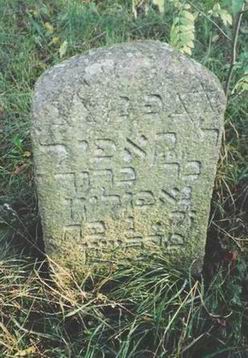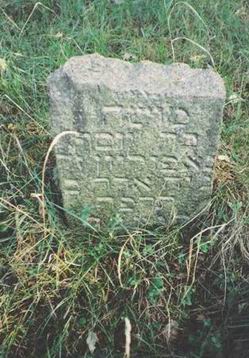
|

|
Died 28 Marheshvan
Died 18 Adar 5684
|
[Pages 89-91]
|
|
||
| Kopel son of R' Baruch Napoleon Died 28 Marheshvan |
Musha daughter of R' Yosef Napoleon Died 18 Adar 5684 |
|
Itale Slovo in her letter of April 13, 1937: I am so sad today. Avram-Itze Pores died. My sister Sonya and I went to his funeral. We came to that place and cried. There such a young person [Velvele Slovo] has already been lying in the ground for a whole year. Our brother Lolka was in Kovno [Kaunas] and made big pictures for his grave. How are you, our friend? How was the long journey? It interests us to hear. Send us the diary. We had “A Third Seder” at Passover, and it was very merry. The members of our movement passed the “stage”, but we had a great sorrow. Yoel Zeif mentioned the name of our 'brother' David Bun, who is lying in the dark ground at a young age. We went to his funeral and cried bitterly. There was a very large funeral. The rabbi spoke and everyone cried profusely. When members come to the “kibbutz” it gives us great pleasure, but on the other hand we are missing our 'brother', so the joy diminishes. At school all the students are happy, but one seat is empty, and everyone knows that that student will never come again. In each “kibbutz” of Habirim they recall that young and pure soul, and everyone cries. It was very miserable here two weeks before Passover. He (David Bun) was a good friend to you, and to all of us. He thought more about traveling to Africa than about dying. Before his death he still read a letter from his father and was very happy that he would be traveling to Africa, but no one knows what their future will be. He wasn't ill for long. He was still walking around on Friday, and no one knew that he was ill. And that Friday night he died. We were at the “kibbutz”, when Beila Fein and Ida Slova arrived in tears. They told us that our brother David Bun had died. We all started crying. The next morning, on the Sabbath, we gathered at Shunka's and cried profusely. He died wearing his complete movement uniform with the tie and with the recorder. Regards from everyone in our group and from our leader. Your friends who miss you, Chana, Shuna and Etzele. Hazak Ve'ematz![1]
|
Footnote
Rasya Tal (Kagan): The bathhouse stood near the lake. On Thursdays the women went to bathe there, and the men went on Fridays. We always went with our mother. I remember that we went at night, after we had already finished cleaning the house for the Sabbath. We tried to go there in a group. The Shubs and the Sleps were always with us.At the entrance to the bathhouse sat the attendant, who drew water and distributed it to us in pails. We also received the bezem[1] from him. The soft leaves gave off a pleasant scent, and even now I feel as though I can smell that smell. We used to leave that switch in the bathhouse, probably to be reused…
We entered through a small corridor that was always wet, and kerosene lamps shone there. We went into the large hall and undressed. The first thing we did was to wash our bodies with soap and wash our hair. Some of the women, apparently the sickly and weak ones, did no more than this. But the main wash was in the hot bath. In that room there were several wide stairs, perhaps three, and on the top step it was intolerably hot! Where did the heat come from? In a niche in the corner were glowing embers, and above them an iron apparatus on which stones were placed, and these turned boiling hot from the heat.
One of us would stand on the other side of the niche, usually the oldest or strongest one from among us, and pour water over the boiling hot stones. And then – at once – thick, hot steam would rise up and fill the room. My mother would say to me: “Breathe, breathe; it is good for your throat”. We would all breathe, in and out. Afterwards we lay flat on the step and received lashes from the bezem, especially on the back and legs. Because of the heat and the steam, it was impossible to remain there for longer than ten minutes.
I remember the bathhouse experiences from the age of five. The children used to run around and play there, and the noise was overwhelming.
I remember that my mother would suddenly disappear. Where to? Only when we grew older did we know that the women “disappeared” when they went to the mikve [ritual bath].
Dovid-Leib Aires: There, in the mikve, which was a wooden pool, we received our first swimming lessons…
Footnote
|
JewishGen, Inc. makes no representations regarding the accuracy of
the translation. The reader may wish to refer to the original material
for verification.
JewishGen is not responsible for inaccuracies or omissions in the original work and cannot rewrite or edit the text to correct inaccuracies and/or omissions.
Our mission is to produce a translation of the original work and we cannot verify the accuracy of statements or alter facts cited.
 Dusetos, Lithuania
Dusetos, Lithuania
 Yizkor Book Project
Yizkor Book Project
 JewishGen Home Page
JewishGen Home Page
Copyright © 1999-2024 by JewishGen, Inc.
Updated 5 Sep 2008 by LA